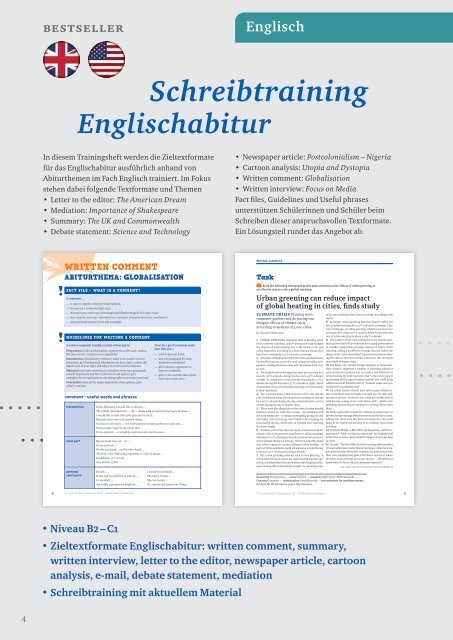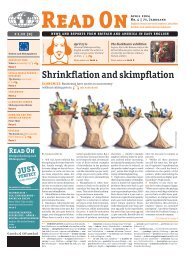Erfolgreiche ePaper selbst erstellen
Machen Sie aus Ihren PDF Publikationen ein blätterbares Flipbook mit unserer einzigartigen Google optimierten e-Paper Software.
estseller Englisch Trainingshefte<br />
Schreibtraining<br />
Englischabitur<br />
Bereits in der Reihe erschienen:<br />
In diesem Trainingsheft werden die Zieltextformate<br />
für das Englischabitur ausführlich anhand von<br />
Abiturthemen im Fach Englisch trainiert. Im Fokus<br />
stehen dabei folgende Textformate und Themen<br />
• Letter to the editor: The American Dream<br />
• Mediation: Importance of Shakespeare<br />
• Summary: The UK and Commonwealth<br />
• Debate statement: Science and Technology<br />
!<br />
!<br />
A<br />
WRITTEN COMMENT<br />
ABITURTHEMA: GLOBALISATION<br />
FACT FILE – WHAT IS A COMMENT?<br />
A comment …<br />
— is used to express /state personal opinion.<br />
— focuses on a (controversial) topic.<br />
— discusses pros and cons (advantages and disadvantages) of a topic /issue.<br />
— has a specific structure (introduction, main part with pros and cons, conclusion)<br />
— uses personal opinion, facts and examples.<br />
GUIDELINES FOR WRITING A COMMENT<br />
written comment usually consists of four parts:<br />
Preparation: Collect information/arguments on the topic, make a<br />
list (key words), structure your arguments<br />
Introduction: introductory sentence, make your reader curious/<br />
interested, give background information on your topic; outline the<br />
importance of your topic and why it is controversial to discuss<br />
Main part: use topic sentences to introduce every new paragraph,<br />
present arguments and facts in favour of and against, give<br />
examples/facts/explanations, use paragraphs to structure your text<br />
Conclusion: Sum up the major arguments, state opinion, give<br />
a final comment<br />
comment – useful words and phrases<br />
introduction<br />
main part<br />
personal<br />
conclusion<br />
In the following I would like to discuss …<br />
4 © 2021 Carl Ed. Schünemann KG · Alle Rechte vorbehalten.<br />
To write a good comment make<br />
sure that you …<br />
— stick to present tense.<br />
— use one paragraph for each<br />
argument mentioned.<br />
— give reasons/arguments to<br />
state your opinion.<br />
— give a view on both sides of the<br />
topic (pros and cons).<br />
The article/documentary … by … deals with a controversial topic because …<br />
I would like to talk about the pros and cons of …<br />
Recently there was a discussion about …<br />
To focus on the topic … it is interesting to weigh up the pros and cons …<br />
Some people/experts say/state that …<br />
In my opinion … is a highly controversial topic because …<br />
My personal view on … is …<br />
In my opinion …<br />
On the one hand…on the other hand …<br />
The first/next/following argument is/clearly shows …<br />
In addition, we can say …<br />
As a matter of fact …<br />
Finally, …<br />
In the end I would like to sum up …<br />
I a nutshell, …<br />
A possible consequence might be …<br />
I would recommend …<br />
Therefore I think …<br />
My conclusion …<br />
To consider all important things …<br />
• Newspaper article: Postcolonialism – Nigeria<br />
• Cartoon analysis: Utopia and Dystopia<br />
• Written comment: Globalisation<br />
• Written interview: Focus on Media<br />
Fact files, Guidelines und Useful phrases<br />
unterstützen Schülerinnen und Schüler beim<br />
Schreiben dieser anspruchsvollen Textformate.<br />
Ein Lösungsteil rundet das Angebot ab.<br />
Written comment<br />
Task<br />
Read the following newspaper article and comment on the effects of urban greening as<br />
an effective way to reduce global warming.<br />
Urban greening can reduce impact<br />
of global heating in cities, finds study<br />
CLIMATE CRISIS Planting trees,<br />
rainwater gardens and de-paving can<br />
mitigate effects of climate crisis,<br />
according to analysis of 2,000 cities.<br />
By Waseem Mohamed<br />
1 URBAN GREENING initiatives such as planting street<br />
trees, rainwater gardens, and de-paving can help mitigate<br />
the impacts of urban heating due to the climate crisis and<br />
urban expansion, according to a study that has found cities<br />
have been warming by 0.5°C a decade on average.<br />
2 Scientists at Nanjing and Yale Universities analysed satellite<br />
data from across 2,000 cities and compared surface temperature<br />
readings between cities and rural areas from 2002<br />
to 2021.<br />
3 The study found on average that cities are warming by a<br />
rate of 0.56°C a decade during the day and 0.43°C a decade<br />
at night. In comparison, rural areas are warming by 0.4°C a<br />
decade during the day and 0.37°C a decade at night, which<br />
means urban areas are on average warming 29% more quickly<br />
than rural areas.<br />
4 The scientists found a link between a city’s size and the<br />
rate of urban warming, with megacities warming on average<br />
by 0.69°C a decade during the day, compared with 0.41°C a<br />
decade during the day in smaller cities.<br />
5 There were also disparities in the rates of urban heating<br />
between continents, with cities in Asia – the continent with<br />
the most megacities – warming most rapidly during the day<br />
and night. Cities in Europe were found to be warming the<br />
least during the day, while cities in Oceania were warming<br />
the least at night.<br />
6 In about 90% of the cities surveyed, scientists found the<br />
climate crisis is the greatest contributor to urban warming,<br />
with about 0.3°C of heating a decade attributed to human-induced<br />
climate change on average. However, scientists noted<br />
that urban expansion can also influence urban heating – in<br />
parts of China and India, rapid urbanisation is contributing<br />
to about 0.23°C of urban warming a decade.<br />
7 But urban greening schemes such as tree planting, in<br />
which exposed land surfaces are replaced with natural vegetation,<br />
can help reduce the rate of urban warming by producing<br />
a cooling effect particularly at night, by capturing some<br />
© 2021 Carl Ed. Schünemann KG · Alle Rechte vorbehalten.<br />
of the surrounding surface heat for storage, according to the<br />
report.<br />
8 In Europe, urban greening has been found to offset the<br />
rate of urban warming by 0.13°C a decade on average. Likewise<br />
in Chicago, an urban greening scheme to increase tree<br />
coverage after a heatwave in 1995 has helped to decrease the<br />
rate of urban warming by about 0.084°C a decade.<br />
9 The authors of the study published in the journal Communications<br />
Earth & Environment have urged policymakers<br />
to consider using urban greening schemes to reduce urban<br />
warming, calling it an effective strategy that can reduce the<br />
impact of the “urban heat island” phenomenon, hence reducing<br />
the risk of exposure to future heatwaves that are much<br />
more likely to impact cities.<br />
10 Jon Burke, the climate change manager at Gloucestershire<br />
council, suggested a number of greening initiatives<br />
such as rainwater gardens that can make a real difference to<br />
urban heating. He said vegetation had “a big role to play in<br />
moderating all the types of urban heating” and could bring<br />
additional social benefits such as “reduced crime and prescriptions<br />
for antidepressants”.<br />
12 UK urban leaders should have taken green infrastructure<br />
investment more seriously a decade ago, he said, adding<br />
that at present “there isn’t one urban area within the UK<br />
with average canopy street cover above 40%”, which is the<br />
minimum amount of cover needed for a cooling effect to take<br />
place.<br />
13 Burke said leaders needed to “initiate an urgent race” to<br />
prevent further damage from heatwaves and floods in cities,<br />
adding that there were few better investments a city could<br />
make in the health and security of its residents than urban<br />
greening.<br />
14 Grahame Madge, a Met Office spokesperson, said the organisation’s<br />
“high-resolution projections” are helping local<br />
authorities to better understand the impact of extreme heat<br />
in cities.<br />
15 He said: “The Met Office has been working with a number<br />
of local authorities to help inform their heat resilience strategies<br />
and planning. When they combine this information with<br />
their own mapping they gain a far clearer picture of where<br />
the areas of greatest risk are across the city … this ability to<br />
know where to focus effort is extremely important.”<br />
de-paving Entsiegelung — rural ländlich — megacity Metropole; Millionenstadt —<br />
Oceania Ozeanien — urbanisation Verstädterung — prescriptions for antidepressants<br />
Rezepte für Medikamente gegen Depressionen<br />
Thu, 29 Sep 2022 © 2022 Guardian News and Media Ltd<br />
5<br />
Comment & Co. – Summarizing Information<br />
and Forming Opinions<br />
52 Seiten, DIN A4, Softcover, erschienen 01.09.2023<br />
¤ 16,90<br />
ISBN 978-3-7961-1181-5<br />
B2 – C1<br />
Cartoon & Co.<br />
40 Seiten, DIN A4, Softcover<br />
¤ 14,90 [D]<br />
ISBN 978-3-7961-1062-7<br />
Charts & Co.<br />
72 Seiten, DIN A4, Softcover<br />
¤ 16,90 [D]<br />
ISBN 978-3-7961-1073-3<br />
A2 – B2<br />
A2 – B2<br />
• Niveau B2 – C1<br />
• Zieltextformate Englischabitur: written comment, summary,<br />
written interview, letter to the editor, newspaper article, cartoon<br />
analysis, e-mail, debate statement, mediation<br />
9 783796 111815<br />
• Schreibtraining mit aktuellem Material<br />
4 5

















